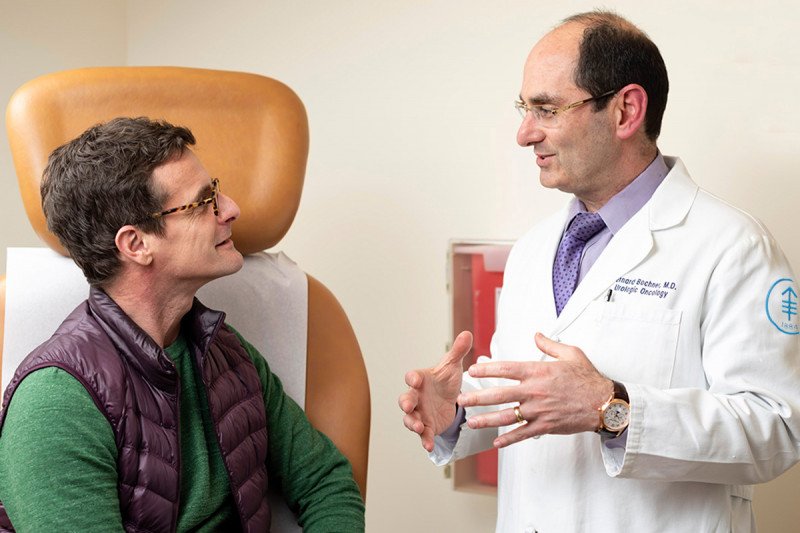
Research by urologic surgeon Bernard Bochner shows people who had bladder removal surgery at MSK recovered well and enjoyed a high quality of life.
The treatments for bladder cancer are:
- Surgery
- Chemotherapy
- Radiation Therapy
- Immunotherapy
- Antibody-Drug Conjugate Drugs for Bladder Cancer
- Bacillus Calmette-Guerin (BCG) Therapy
- Targeted Therapy
MSK also combines these treatments, depending on whether the tumor has grown into the muscle or metastasized (spread). Our goal is to preserve your bladder or rebuild it, if removing it was the best treatment for you. We also aim to keep your quality of life. Before we recommend treatment, you may meet with a surgeon, radiation oncologist, and a medical oncologist (cancer doctor).
The latest in bladder cancer treatments
Immunotherapy is a newer way to treat bladder cancer. It uses the immune system to attack cancer cells.
Antibody-drug conjugates (ADCs) and checkpoint inhibitors are promising new drugs that have changed how we treat bladder cancer.
Non-muscle invasive bladder cancer (NMIBC) can be treated with surgery followed by bacillus Calmette-Guérin (BCG) therapy. People often come to MSK for BCG treatment after their healthcare provider offered chemotherapy as the only treatment option for high-grade NMIBC.
Bladder Cancer Surgery
Surgery is a treatment for bladder cancer that has not spread to other parts of the body. For early-stage cancer, we use transurethral (TRANZ-yoo-REE-thrul) resection of a bladder tumor (TURBT). In this surgery, we remove the tumor using a tool in the cystoscope.
For higher risk bladder cancer, often the best treatment is removing your bladder. This is called a radical cystectomy. We can often create a new bladder at the same time. This is called a neobladder. You will not need a pouch outside your body that collects urine.
Learn about bladder cancer surgery at MSK.
Chemotherapy for Bladder Cancer
Chemotherapy is a treatment that uses a drug or combination of drugs to kill cancer cells anywhere in your body. It often is used after surgery for early-stage bladder cancer that has not grown into the muscle.
The standard treatment for people with metastatic bladder cancer is platinum-based chemotherapy. MSK is now researching a promising treatment that may help people who can’t have cisplatin-based chemotherapy. The new approach combines 2 drug classes, antibody-drug conjugates (ADCs) and checkpoint inhibitors.
Learn about chemotherapy for bladder cancer at MSK.
Radiation Therapy for Bladder Cancer
Radiation therapy uses high-energy beams to treat cancer. It works by harming the cancer cells so it’s hard for them to grow.
MSK’s radiation oncologists (doctors who use radiation to treat cancer) may use radiation instead of surgery for some bladder tumors. It may also be used after surgery to kill any cancer cells that remain.
At MSK, radiation treatment is guided by very advanced imaging methods that are not available at most hospitals. This includes image-guided radiation therapy (IGRT), which can treat tumors with even more accuracy than regular radiation therapy.
Learn about radiation therapy for bladder cancer at MSK.
Immunotherapy for Bladder Cancer
Immunotherapy triggers the body’s immune system to fight cancer cells.
MSK is leading research on immunotherapy drugs called checkpoint inhibitors. This treatment can be used instead of chemotherapy. It also can be used after chemotherapy has been tried for advanced bladder cancer that has spread. For people who respond to checkpoint inhibitors, the drugs can have a longer impact than chemotherapy, with fewer side effects.
The checkpoint inhibitor called pembrolizumab also can be used for non-muscle invasive bladder cancer (NMIBC). It’s for people with NMIBC that has returned and is worse after BCG therapy.
Learn about immunotherapy for bladder cancer at MSK.
Bacillus Calmette-Guérin (BCG) Therapy for Bladder Cancer
Non-muscle invasive bladder cancer (NMIBC) can be treated with surgery followed by bacillus Calmette-Guérin (BCG) therapy. People often come to MSK for BCG treatment after their healthcare provider offered chemotherapy as the only treatment option for high-grade NMIBC.
This type of immunotherapy is used when there is a high risk of bladder cancer coming back after surgery. It triggers an inflammatory response in your bladder that stops the tumor from growing. BCG is given once a week, for 6 weeks.
Learn about BCG therapy for bladder cancer at MSK.
Clinical Trials for Bladder Cancer
Clinical trials are research studies that test new treatments, procedures, or devices to see how well they work. They are an important part of helping to prevent, treat, and cure cancer. Almost every cancer treatment given to patients was first tested during a clinical trial. MSK patients can join a clinical trial to get treatment options not available anywhere else.
To find a bladder cancer clinical trial that may be right for you, visit our clinical trials page. Go to the “Search by keywords” search bar. Type in “bladder cancer” or the type of bladder cancer, such as:
- Non-muscle invasive bladder cancer
- Muscle invasive bladder cancer
- Metastatic urothelial carcinoma
You’ll see a list of clinical trials, and whether they are a pilot or phase 1 to 4. For information on phases and clinical trials, please read Clinical Trials at MSK: What You Need to Know.
Bladder Cancer Follow-Up Care
Your time with MSK does not end with your active bladder cancer treatment. Your follow-up care team will continue to support you. They can:
- Help you have a faster recovery.
- Help you manage side effects.
- Monitor your overall health.
- Make sure you stay cancer free.
Follow-up care for bladder cancer includes regular exams and tests, such as:
- X-rays.
- Urine tests.
- Blood tests.
- If you still have your bladder, your doctor will examine it using a cystoscope.
- If you had a neobladder or urinary diversion, your doctors will check for infection using urine tests.
Tell us if you see any bladder cancer symptoms
Most bladder cancer treatment is successful. But it’s important to be checked for signs of the cancer coming back. You’re still at risk for getting bladder cancer. Your care team will monitor you for any signs of cancer.
Tell your care team about any new symptoms. Blood in the urine (hematuria) is often the most common sign. These symptoms can mean the cancer has come back, or another medical condition.
Your bladder cancer follow-up care team
During your follow-up care, you will see an MSK advanced practice provider (APP). One type of APP is a nurse practitioner (NP). Your NP has special training in follow-up care for people who had bladder cancer. They will monitor you for signs of cancer and help you manage any side effects after treatment.
A visit with your NP includes:
- A physical exam and a review of your recent medical history.
- Screening referrals for other cancers.
- Prevention and healthy lifestyle recommendations. This includes nutrition, exercise, and help with quitting smoking and other tobacco use.
After each visit, your NP will give a treatment summary and survivorship plan of care. Your treatment team will use this information in your care plan.
Your MSK Follow-Up Provider

Family Nurse Practitioner

Nurse Practitioner

Nurse Practitioner
Why should I choose Memorial Sloan Kettering for bladder cancer treatment?
MSK’s team of bladder cancer experts
- MSK’s bladder cancer experts deliver high quality, compassionate cancer care.
- Our team of urinary oncology experts is among the most experienced in the world in all forms of bladder cancer treatment. MSK is ranked #1 in Urology Cancer Care by U.S. News & World Report.
- MSK experts work very closely together to share treatment ideas. They help you start care right away, which can mean better treatment results.
Learn more about why you should choose MSK for bladder cancer treatment.




